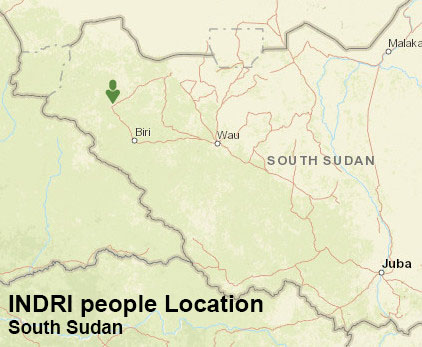

Indri are the members of an ethnic group of South Sudan. Most of them are Muslims. The number of persons in this group is about 1,000. They speak Indri, a Ubangian language.
Demography and GeographyNumbering a few thousands (no statistics), the Indri are found in the neighbourhood of Raja (or Raga) town in western Bahr el Ghazal. There are 2 known clans: the Mborokukwa and the Menah or Boro. Their most important settlement is Ngula, named after a neighbouring stream. |
 |
The area has a rugged topography cut by numerous small perennial streams. The climate is tropical and the main socio-economic activities include subsistence agriculture, trading, etc. The main food crops are sorghum, maize, millet, groundnuts, simsim, etc.
The Indri people have no clear idea of their origin. They believe they were created in the neighbourhood of Raga and that is all. Their lack of tradition and sense of national entity, compounded by their small numbers makes it difficult to trace their origin. The Indri were subjugated by the Feroghe in the 1930s.
The Indri had a language of their own. However, their absolute lack of tradition has rendered them susceptible to outside influences including adopting foreign languages. Most of them speak Arabic and Feroghe languages.
The real name of the tribe, in their own language, is Ya-ndiri-ka, which has been shortened to Indri. They were ill-organised as a community or nationality. They were so vulnerable that they lost social contact and hence, lost common tradition and social fabric that normally link people. The Indri as a people, succumbed in all their practical and ideological aspects to their powerful neighbours.
The Indri used to have some form of traditional authority. The last chief of the Indri was Baningo Zeri just before Sultan Hammad Musa of the Feroghe subjugated the whole tribe in 1930s.
The Indri had one paramount spirit (Monofelee) to whom they solemnly conducted a feast (karama) in his honour. The Indri have converted to Islam and therefore subscribe to the Islamic Sharia law and practices, although traditional practices and offerings to the ancestral spirits still endure.
The extensive influence of Islamic religion and practices; their subjugation by the Feroghe meant that Indri could not be expected to have anything of their own.
The Indri used to neighbour the Kreish, Ndogo and the Feroghe, who have subjugated and assimilated them.
Many clans of the Indri have socially and culturally disappeared as a separate entity. They have been assimilated by their neighbours particularly the Feroghe.
Sources: